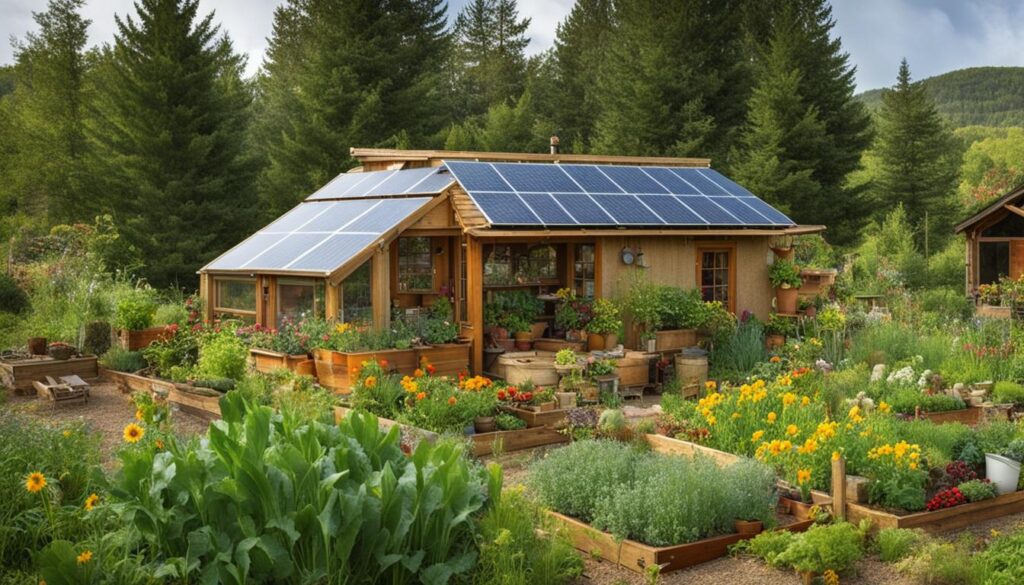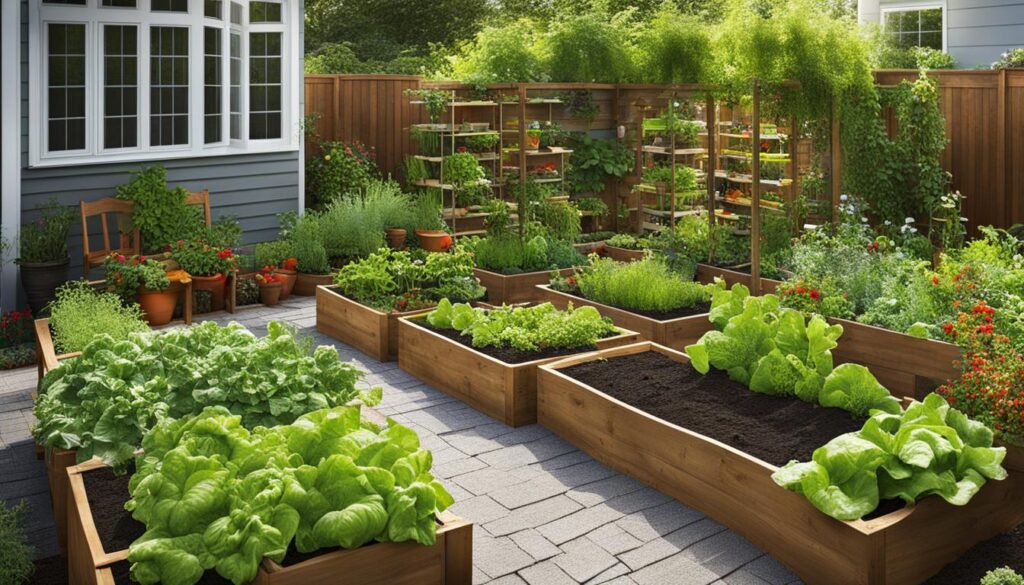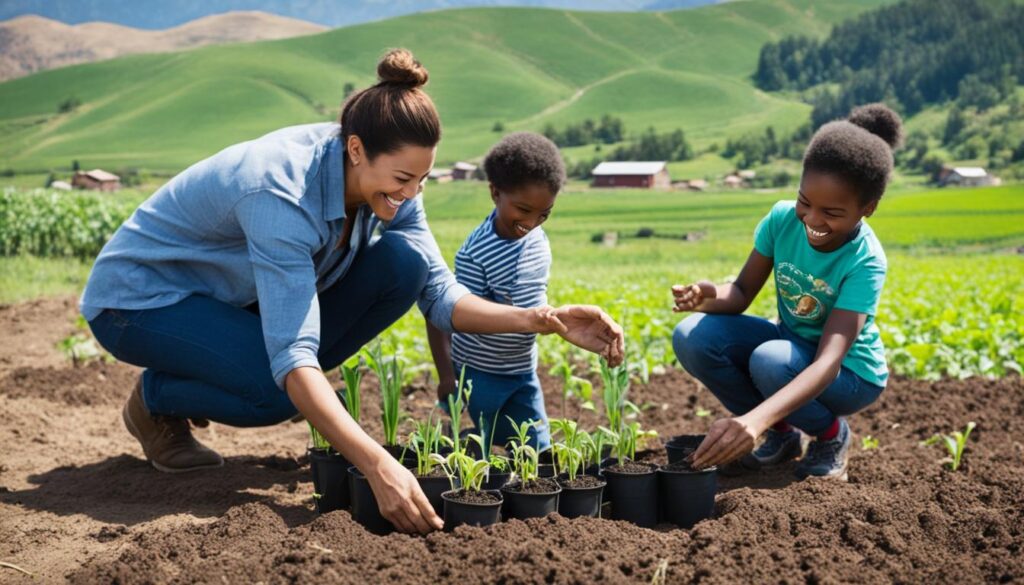
As a parent, I believe in the importance of teaching my children valuable life skills that will shape their future. One such skill is self-reliance, and what better way to impart this knowledge than through homesteading? Homesteading with kids is not just about teaching them how to grow vegetables or raise chickens; it’s about instilling a sense of independence, sustainability, and appreciation for the world around them.
When we involve our children in homesteading activities, we are not only giving them the opportunity to learn practical skills but also passing on a legacy of self-sufficiency to the next generation. By getting their hands dirty in the garden, caring for farm animals, and cooking with fresh ingredients, children develop a deep connection with nature and learn the importance of hard work, responsibility, and teamwork.
Teaching sustainability is crucial in today’s world, where environmental challenges are becoming more apparent. By fostering a love for homesteading in our children, we are equipping them with the tools to live a self-sustainable life and make a positive impact on the planet. From an early age, they learn the value of reducing waste, conserving resources, and nurturing the Earth’s natural gifts.
Gardening with kids is not only a bonding experience but also a way to teach them about patience, growth, and the cycle of life. From planting seeds and watching them sprout to harvesting the fruits (or vegetables) of their labor, children gain a sense of accomplishment and self-confidence. They learn that hard work pays off and that they have the power to nurture and provide for themselves.
When we involve our kids in raising farm animals like chickens, they learn about animal care, compassion, and the circle of life. Gathering eggs and tending to the needs of these feathered friends teaches them responsibility and the importance of nurturing another living being. Plus, what better way to start teaching our children about entrepreneurship than by letting them sell farm-fresh eggs?
As we teach our children homesteading skills, we also provide them with the foundation for a healthier, more sustainable lifestyle. By cooking and preserving food together, we foster a love for real, wholesome meals made from scratch. We teach our children the importance of nourishing their bodies with fresh ingredients and reducing food waste through canning and preserving.
Key Takeaways:
- Homesteading with kids teaches self-reliance and sustainability.
- Children learn practical skills, appreciate hard work, and understand responsibility.
- Gardening fosters patience, growth, and self-confidence.
- Caring for farm animals teaches compassion and business skills.
- Cooking and preserving food promote healthy eating habits and reduce food waste.
Why Teach Kids Homesteading Skills?
Teaching children homesteading skills has numerous benefits. It not only equips them with practical knowledge but also imparts valuable life lessons that will shape them into responsible and self-reliant individuals.
Life Lessons: Work Ethic and Responsibility
One of the key benefits of teaching kids homesteading skills is instilling a strong work ethic. By involving them in tasks such as gardening, animal care, and preserving food, children learn the value of hard work and the satisfaction of seeing their efforts bear fruit. They understand that success comes as a result of dedication and perseverance, setting them up for future accomplishments.
Moreover, taking on homesteading responsibilities teaches children about accountability. They learn that their actions have consequences and that they must take ownership of their tasks. This sense of responsibility extends beyond the homestead, shaping their character and preparing them to meet challenges with poise and maturity.
Building Self-Confidence
Homesteading allows children to witness the direct impact of their contributions. Whether it’s tending to a garden or caring for animals, their active involvement boosts self-confidence as they see how their efforts make a tangible difference. This newfound belief in their capabilities empowers children to take on challenges, explore new avenues, and embrace their strengths.
Developing Teamwork Skills
Homesteading inherently involves collaboration and teamwork. Whether it’s working alongside family members or joining forces with community members, children learn the importance of cooperation and the benefits of collective effort. They discover that by working together towards common goals, they can achieve more and make a significant impact. These teamwork skills not only contribute to their success but also foster strong relationships and a sense of belonging.
Teaching homesteading skills to kids offers a holistic approach to education, combining hands-on experience with important life lessons. The benefits extend far beyond self-sufficiency, empowering children with a work ethic, self-confidence, a sense of responsibility, and the ability to work harmoniously in a team. By equipping them with these skills, we are shaping the next generation to be self-reliant, capable, and compassionate individuals.
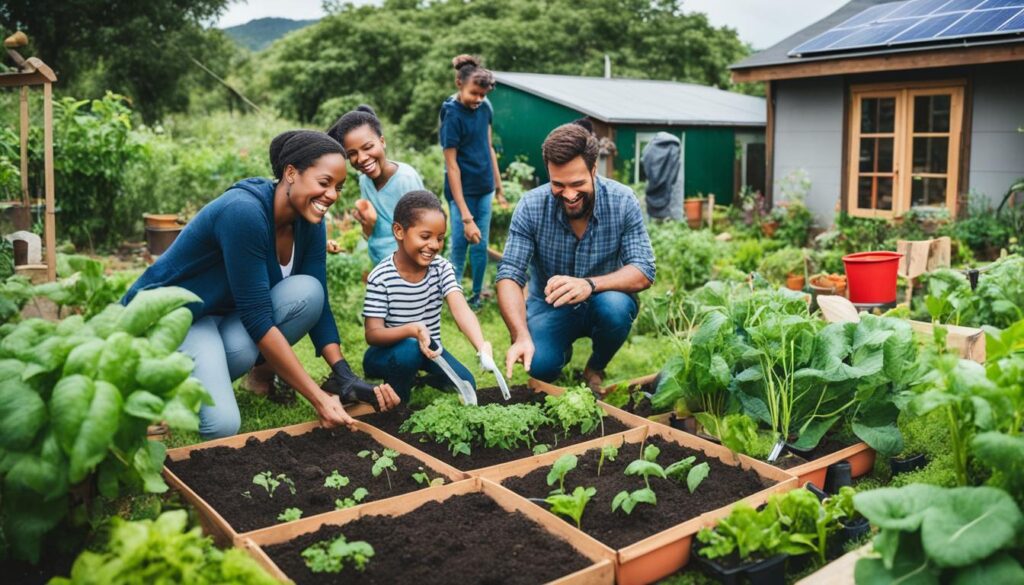
“Homesteading with kids is not just about teaching them how to provide for themselves; it’s about enriching their lives and molding them into self-reliant and responsible individuals who are ready to take on the world.” – Michelle Thompson
Foraging
Foraging is a wonderful way for kids to connect with nature and gain a deeper understanding of the world around them. It offers a range of benefits, from teaching them about plants and insects to discovering natural items that can be used in fun DIY projects. Through foraging, children can learn valuable skills while having a great time outdoors.
When kids go foraging, they have the opportunity to learn about different plants and their uses. They can identify edible fruits, vegetables, flowers, and herbs, and gain knowledge about their nutritional value and culinary applications. This hands-on experience helps children develop a broader understanding of the abundance and usefulness of nature’s resources.
Foraging also provides an excellent opportunity for kids to discover and learn about various insects. They can observe different species and understand their roles in the ecosystem. By studying insects, children develop a deeper appreciation for the intricate interconnectedness of nature.
Moreover, foraging allows children to explore their creativity through fun DIY projects. They can collect natural materials like leaves, twigs, and stones to create beautiful crafts and artwork. Whether it’s making leaf rubbings, building fairy houses, or designing nature-inspired jewelry, foraging provides endless possibilities for imaginative play.

| Benefits of Foraging: |
|---|
| Connecting with nature |
| Teaching about plants and insects |
| Discovering natural items |
| Fun DIY projects |
Overall, foraging is an enriching and educational activity for kids. It not only promotes a sense of wonder and curiosity but also instills in them a deeper respect for the environment. By encouraging children to forage, we help them develop a strong bond with nature and foster a lifelong love for the natural world.
Gardening
Gardening is a wonderful way to introduce children to the world of homesteading and sustainable living. It provides them with the opportunity to learn new skills, develop self-confidence, and understand the importance of responsibility. Through gardening, kids can experience the joy of nurturing plants and witnessing the fruits of their labor.
When children get involved in gardening, they learn valuable skills such as planting, watering, and harvesting. These skills not only empower them but also foster a sense of accomplishment as they see their efforts result in blooming plants and nutritious produce.
Gardening instills a sense of self-confidence in children as they take ownership of their garden and witness the positive outcomes. It boosts their self-esteem and teaches them the value of hard work and perseverance.
Responsibility is another important lesson that gardening offers. Children learn about the care and maintenance required for plants to thrive. They understand the significance of watering, fertilizing, and protecting plants from pests and diseases. This responsibility teaches them about nurturing, patience, and the cycles of life.
Moreover, gardening introduces children to the concept of sustainable living. They learn about the importance of conserving resources, reducing waste, and utilizing organic practices. Gardening encourages them to connect with nature and understand the interconnectedness of all living beings.
Gardening not only teaches children essential skills but also instills in them a deep appreciation for nature, self-confidence, and a sense of responsibility.
“The love of gardening is a seed once sown that never dies.” – Gertrude Jekyll
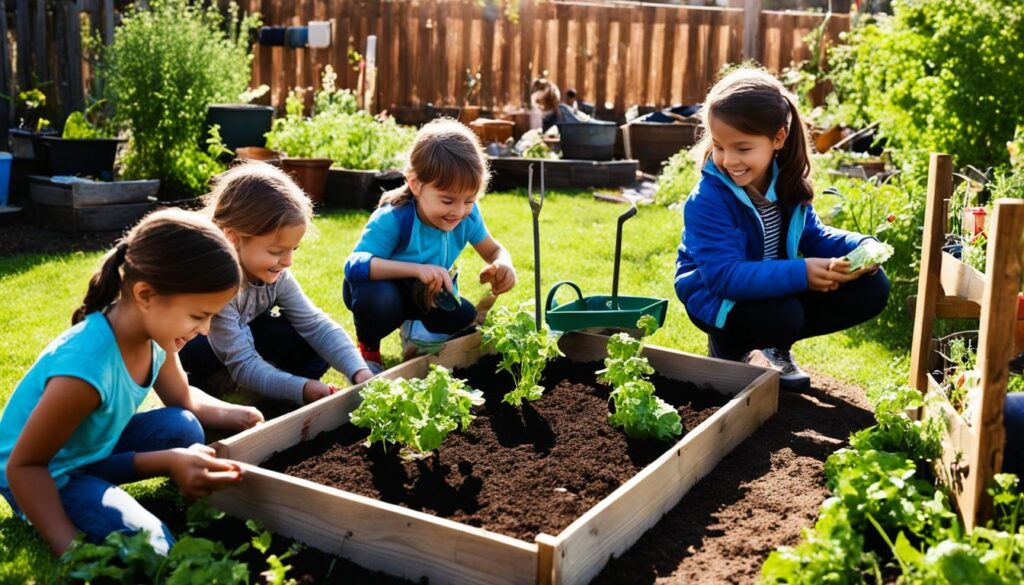
Gardening Benefits for Children:
- Learning new skills like planting, watering, and harvesting
- Developing self-confidence and a sense of accomplishment
- Understanding responsibility and the nurturing of life
- Learning about sustainable living and ecological awareness
Taking Care of Chickens
When it comes to teaching kids about animal care, caring for chickens is a fantastic opportunity. Not only does it allow them to appreciate the wonders of nature, but it also teaches them the value of responsibility and compassion towards another living being.
Children can actively participate in taking care of chickens by engaging in various activities:
Gathering Eggs
One of the most exciting tasks for kids is the daily gathering of eggs. The anticipation of finding freshly laid eggs and the sense of accomplishment that comes with it make this activity both educational and rewarding. They can carefully collect the eggs, ensuring they are clean and undamaged.
Feeding the Chickens
Feeding the chickens is a crucial task that teaches children about the importance of providing proper nutrition for animals. Kids can learn about balanced diets and the different dietary needs of chickens. By actively participating in this activity, they develop a sense of responsibility and empathy for these feathered friends.
Starting a Small Business
For entrepreneurial-minded children, caring for chickens can be the stepping stone to starting a small business. Kids can sell the eggs or even hatch chicks to sell to local farmers or aspiring homesteaders. This experience not only teaches them practical business skills but also instills a sense of self-reliance and financial responsibility.
Using Eggshells in the Garden
Another valuable lesson kids can learn from taking care of chickens is the multiple uses of eggshells. They can learn about the benefits of using crushed eggshells as a natural fertilizer in their garden. This sustainable gardening practice enhances soil quality, prevents pests, and provides essential nutrients to support plant growth.
Teaching kids to care for chickens is a rewarding experience that instills valuable life skills and nurtures a deep connection with nature. Through the responsibilities of gathering eggs, feeding, and potentially starting a small business, children learn about empathy, self-reliance, and sustainable practices.
Table: Benefits of Involving Kids in Caring for Chickens
| Benefits | Description |
|---|---|
| Responsibility | Children learn to take care of another living being and understand their role in providing for the chickens’ well-being. |
| Empathy | Caring for chickens fosters empathy and a sense of connection with animals, teaching children to be compassionate and considerate. |
| Entrepreneurship | Starting a small business with eggs or chicks cultivates entrepreneurial skills, financial responsibility, and a strong work ethic. |
| Sustainable Gardening | Using crushed eggshells in the garden demonstrates the importance of sustainable practices and the benefits of natural fertilizers. |
By involving kids in the care of chickens, we can impart valuable lessons that go beyond animal husbandry. These lessons shape them into responsible individuals who value the environment, understand the importance of sustainable living, and possess the entrepreneurial spirit to make a difference.
Tending to Farm Animals
When it comes to homesteading, caring for farm animals is a vital aspect that offers valuable lessons to children. Taking on the responsibility of tending to these animals not only teaches practical homesteading skills but also fosters emotional and social development.
Children can actively participate in animal care by feeding them, cleaning their living spaces, and even assisting with births. This hands-on experience allows kids to develop a deep connection with the animals and gain a sense of responsibility.
One of the significant benefits of tending to farm animals is the understanding of the value of their manure. Animal waste, or manure, is a valuable resource for composting. By properly managing and utilizing the manure, children learn how to create nutrient-rich compost for their gardens, promoting sustainable and organic farming practices.
Additionally, taking care of farm animals provides an opportunity for children to learn about pasture management. They can assist in ensuring the animals have ample access to fresh grazing areas while preventing overgrazing. This knowledge helps foster an understanding of sustainable land management practices that promote long-term health and productivity.
Overall, caring for farm animals is not just about practical homesteading skills. It is an experience that teaches children empathy, responsibility, and the importance of nurturing living beings. The connections formed with the animals and the land become invaluable life lessons that shape their character and appreciation for nature.
| Benefits of Tending to Farm Animals | Practical Homesteading Skills |
|---|---|
| 1. Emotional and social development | – Feeding and caring for animals – Cleaning animal living spaces – Assisting with animal births |
| 2. Utilizing animal manure for composting | – Learning about composting techniques – Creating nutrient-rich soil for gardening |
| 3. Understanding and implementing pasture management | – Promoting sustainable land management – Ensuring animals have access to fresh grazing areas – Preventing overgrazing and maintaining healthy pastures |
Cooking and Preserving Food
Learning to cook and preserve food is an important aspect of self-sufficient living. By teaching children these skills, we empower them to create delicious meals from scratch, using seasonal produce and reducing reliance on store-bought items. Cooking and preserving food not only promote healthy eating habits but also allow families to enjoy the fruits of their labor throughout the year.
Kids can start by learning basic cooking techniques, such as chopping, sautéing, and baking. As they gain confidence in the kitchen, they can progress to more complex recipes and experiment with different flavors and cuisines.
Furthermore, teaching children the art of canning enables them to preserve food for future use. Canning is an age-old method of storing fruits, vegetables, jams, and pickles, ensuring they remain fresh and flavorful for extended periods of time. By engaging in the process of canning, kids can learn about food preservation techniques and gain a deeper appreciation for the importance of minimizing food waste.
Moreover, involving children in the cooking and preserving process helps them develop essential life skills. From meal planning and budgeting to time management and organization, these activities provide practical experience that will serve them well into adulthood.
The Benefits of Cooking and Preserving Food with Kids
- Encourages healthy eating habits and appreciation for fresh ingredients
- Reduces reliance on processed and packaged foods
- Teaches valuable cooking and food preservation techniques
- Empowers children to take control of their food choices
- Develops essential life skills such as meal planning and budgeting
- Promotes family bonding and teamwork in the kitchen
“Cooking with kids is not just about teaching them how to make a meal; it’s about nurturing their creativity, fostering a love for good food, and instilling lifelong healthy eating habits.” – Unknown
By involving kids in the cooking and preserving process, we equip them with the knowledge and skills to lead a self-sufficient and healthy lifestyle. As they grow, they will carry these skills with them, ensuring a future of wholesome, nourishing meals and a deeper connection to the food they consume.
| Benefits of Cooking and Preserving Food with Kids | |
|---|---|
| Encourages healthy eating habits and appreciation for fresh ingredients | ✓ |
| Reduces reliance on processed and packaged foods | ✓ |
| Teaches valuable cooking and food preservation techniques | ✓ |
| Empowers children to take control of their food choices | ✓ |
| Develops essential life skills such as meal planning and budgeting | ✓ |
| Promotes family bonding and teamwork in the kitchen | ✓ |
Conclusion
Involving children in homesteading activities is a valuable way to teach them self-reliance and sustainability. By immersing kids in the world of homesteading from an early age, we equip them with essential skills that will serve them throughout their lives. Whether it’s gardening, foraging, caring for animals, or cooking and preserving food, these experiences help children develop a sense of responsibility and a deep connection with nature.
Homesteading with kids not only imparts practical knowledge but also instills a strong work ethic and a sense of accomplishment. When children actively participate in the homesteading lifestyle, they learn the value of hard work and perseverance. They witness firsthand how their efforts contribute to the well-being of their family and the environment around them.
By embracing homesteading as a family, we cultivate strong bonds and create lasting memories. Engaging in homesteading activities together fosters teamwork, communication, and a shared sense of purpose. It’s a wonderful opportunity to spend quality time with our children, teaching them life skills while creating a sustainable future for generations to come.
The future of homesteading lies in the hands of our children. By involving them in this way of life, we are not only passing down traditions but also nurturing a generation that understands the importance of self-reliance and environmental stewardship. As our children grow and carry these valuable lessons into adulthood, they will contribute to a future where sustainable living is not just a choice but a way of life.
FAQ
What are the benefits of teaching homesteading skills to kids?
Teaching homesteading skills to kids builds a strong work ethic, fosters self-confidence, and prepares them for the workforce. It also instills responsibility and the value of hard work, and promotes teamwork and helping others.
How can foraging be a fun and educational activity for kids?
Foraging allows kids to connect with nature, learn about different plants and insects, and discover useful and beautiful items. They can collect edible ingredients like fruits, vegetables, flowers, and herbs, as well as natural materials for DIY projects.
How does gardening teach kids about homesteading and sustainable living?
Gardening helps kids learn new skills like planting, watering, and harvesting. It builds their self-confidence as they see their efforts turn into blooming plants and nutritious produce. Gardening also teaches responsibility, nurturing, and understanding the life cycle of plants.
How can kids be involved in taking care of chickens?
Kids can gather eggs, feed the chickens, and even start a small business selling eggs or hatching chicks. They can also learn about using crushed eggshells in their garden. Caring for chickens teaches responsibility and the value of caring for another living being.
What practical homesteading skills can kids learn from tending to farm animals?
Kids can feed the animals, clean their living spaces, and assist with births. They learn about using animal manure for composting and pasture management. Taking care of farm animals also improves their emotional and social skills while providing a deep connection with animals.
How can cooking and preserving food be beneficial for kids?
Cooking and preserving food teach kids how to make food from scratch, reduce reliance on store-bought items, and promote healthy eating habits. Learning the art of canning allows them to preserve food for later use and enjoy the fruits of their labor.
Why is involving children in homesteading activities important?
Involving children in homesteading activities teaches them self-reliance, sustainability, and valuable skills for a self-sufficient future. It also fosters a connection with nature, strengthens family bonds, and prepares the next generation for a sustainable future.

